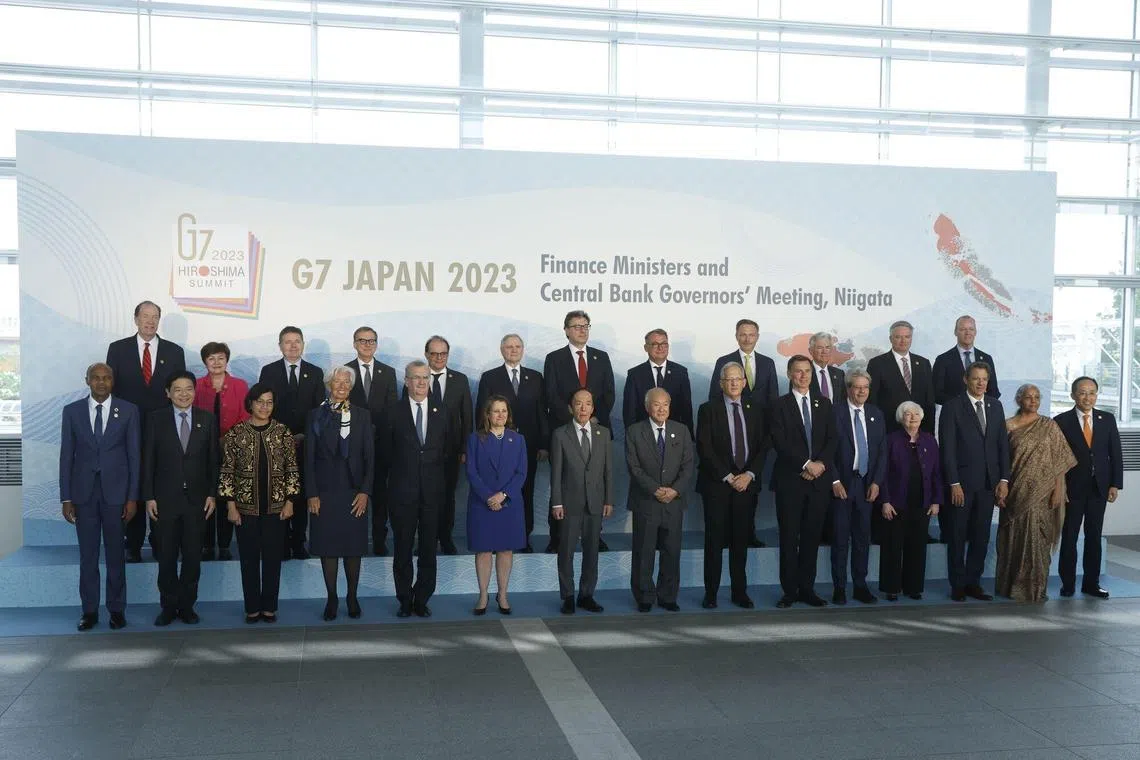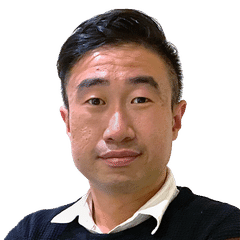DPM Wong has ‘very productive’ day of meetings in rare attendance for Singapore at G-7
Sign up now: Get ST's newsletters delivered to your inbox

Deputy Prime Minister and Finance Minister Lawrence Wong (front row, second from left) with other G-7 finance chiefs and central bank governors and guests from outreach countries in Niigata, Japan, on May 12.
PHOTO: BLOOMBERG
Follow topic:
NIIGATA, Japan – International cooperation through multilateral platforms is crucial to overcome the many challenges facing the global economy, Singapore Finance Minister Lawrence Wong said on Friday.
Mr Wong, who is also Deputy Prime Minister, was in the coastal central city of Niigata as Singapore’s representative at the Group of Seven (G-7) finance ministers and central bank governors’ meeting.
Singapore was one of six non G-7 member countries invited by Japan, the host nation, to attend the meeting of finance chiefs, marking a rare occasion where the Republic attended a G-7 meeting.
The other guest nations were Brazil, Comoros, India, Indonesia and South Korea.
At dialogue sessions, the invited countries spoke on issues like cooperation on sustainable goals, quality infrastructure and supply chains. Debt issues affecting developing countries were discussed at outreach sessions.
Mr Wong said he had a “very productive day” at the meeting, which gave him the “opportunity to reconnect with friends old and new”.
He added that international cooperation through platforms like the G-7, as well as the Group of 20 (G-20) forum for major economies, was crucial. Singapore, while not a G-20 country, is frequently invited to participate at the forum.
Mr Wong said that it was Singapore’s honour to be invited to the G-7, with the six guest countries “sharing our views on how developed and developing countries can work together to create a better and more sustainable future for all”.
He said on Twitter that he met his South Korean counterpart, Mr Choo Kyung-ho, and they “discussed many new opportunities to strengthen bilateral cooperation”. Mr Wong said he congratulated Mr Choo, who is South Korea’s DPM and Economy and Finance Minister, for successfully hosting the Asian Development Bank meeting
The meeting had led to a report that Asean economies will need infrastructure investment of at least US$2.8 trillion (S$3.7 trillion) from 2023 to 2030 to sustain economic growth, reduce poverty and respond to climate change.
Mr Wong also met Indian Finance Minister Nirmala Sitharaman on Friday, and they discussed the tie-up between India’s Unified Payments Interface (UPI) real-time payments system and Singapore’s PayNow facility launched in February.
“We welcome others to come on board,” he said, adding that there were “many more opportunities to collaborate on the digital economy, both bilaterally and at the G-20”.
India is the host of the G-20 forum of major economies in 2023, which holds its main summit in September.
India’s Finance Ministry said the two ministers exchanged views on strengthening bilateral cooperation in food security, climate change and skills development. Ms Sitharaman highlighted the emerging role of artificial intelligence (AI), with the two ministers discussing ways to work together on AI research and quantum computing, the ministry added.
Mr Wong also met Canada’s DPM and Finance Minister Chrystia Freeland, and had a brief chat with outgoing World Bank president David Malpass.
He added that he spoke to Mr Mathias Cormann, secretary-general of the Organisation for Economic Cooperation and Development, with which Singapore enjoys close cooperation on such issues as education, international tax and carbon mitigation.
Mr Wong also met United States Federal Reserve chairman Jerome Powell and Indonesian Finance Minister Sri Mulyani Indrawati.
The G-7 Leaders’ Summit is due to be held in Hiroshima from May 19 to 21.


